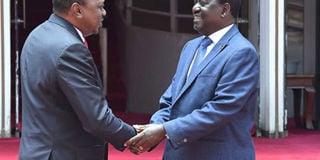Ruto, Uhuru supporters least supportive of truce with Raila

President Uhuru Kenyatta and opposition chief Raila Odinga at Harambee House on March 9, 2018. FILE PHOTO | NATION MEDIA GROUP
What you need to know:
Support is highest in Nyanza at 88 per cent, with North Eastern and Nairobi following at 86 and 78 per cent respectively.
Of the 17 per cent who said they do not support the handshake, majority said that they did not think it was genuine.
Eight out of every 10 Kenyans support the handshake between President Uhuru Kenyatta and Orange Democratic Movement leader Raila Odinga, saying it has brought peace and cooled political temperatures, a study by Infotrak shows.
This support is highest in Nyanza at 88 per cent, with Northeastern and Nairobi regions following at 86 and 78 per cent respectively.
The support for the March 9 handshake is, however, lowest in Rift Valley and the Coast where 19 per cent of those polled said they do not support it. They are followed closely by Central where 20 per cent of the residents said they do not support the call for truce.
HANDSHAKE DEAL
The two leaders shook hands on the steps of Harambee House following a protracted elections crisis and agreed on nine issues they said must be addressed to achieve a more united Kenya.
These are ending corruption and divisive elections, strengthen devolution, and address ethnic antagonism, lack of national ethos, inclusivity, and safety and security of Kenyans for a shared prosperity.
The implementation of the nine points has now been tasked to a 14-member Building Bridges Initiative team chaired by Garissa Senator Yusuf Haji deputised by University of Nairobi professor Adams Oloo, and who have been collecting views across the country.
'WEAKENED OPPOSITION'
Of the 17 per cent who said they do not support the handshake, majority said that they did not think it was genuine, claiming it has weakened the opposition and only benefits the two leaders.
The Infotrak survey, done in collaboration with the Integrated Development Network, was held between November 29 and December 1, 2018, with 1,500 people interviewed in 24 counties.
The survey had a 2.5 per cent margin of error, with a 95 per cent confidence rate.
GRAFT FIGHT
On corruption, 52 per cent of Kenyans said that the government was doing enough to address the fight, citing regular arrests of high profile individuals, their prosecutions, and what they said was a good working relationship between the Director of Public Prosecutions and the Directorate of Criminal Investigations.
Those who felt that the government is not doing enough to fight corruption cited rampant corruption (52 per cent), no action is taken against the corrupt (29 per cent) and lack of high profile convictions (19 per cent).
UHURU RATING
Overall, 48 per cent of surveyed Kenyans rated the performance of President Kenyatta as good, with 40 per cent rating it as average, while 12 per cent said he had performed poorly.
Top among the regions that rated his performance as good were North Eastern (60 per cent), Rift Valley (53 per cent), Central (52 per cent) and Western (51 per cent).
Those who rated him favourably cited improvement in the quality of education and administration of ‘clean’ national examinations, infrastructure development, and his sustained fight against corruption.
The President was rated poorly in Nairobi (24 per cent), Western (15 per cent) Eastern and Coast (14 per cent), with the dissatisfied Kenyans citing high cost of living, unfulfilled campaign promises, and rampant corruption in his government.





